Ranking the Best Third Baseman in Mariners History
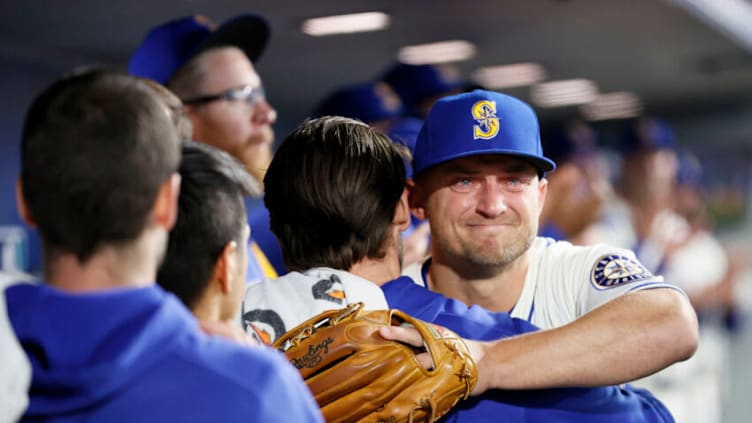
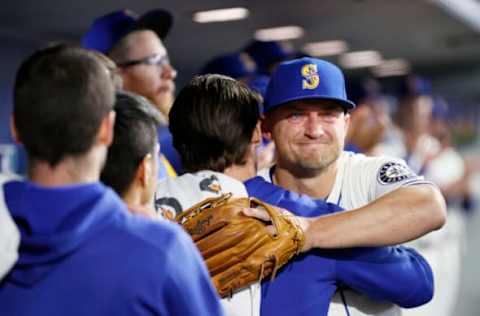
If the second baseman rankings were an odd list, then the third baseman one is making me realize that maybe eight-year-old me could’ve benefited a bit from modern analytics. There are a few guys from the 90s who I thought were okay, but Fangraphs doesn’t agree with that at all. There’s no argument about the top third baseman in Mariners history or even the second-best.
But… what about the rest of the list?
I think we are all about to get a history lesson today when we start looking at who missed out on the top five. There are going to be a decent amount of you (not a lot) that are able to sit and think for a moment about who the top-five likely are and end up being correct.
If you are able to guess most of the guys in that 6-10 range… holy cow, you would be either an incredible fan or have an incredible memory. Like the guys tied at #9, Rico Rossy, Justin Leone, and Doug Strange. They all had a 0.2 fWAR.
Rossy didn’t play pro ball from 94-97, came back with the M’s in 1998 to a sub 200 average with good defense, and that was it. Leone played a little bit in 04 in his first taste of the majors with a decent OBP and SLG, then bounced around other teams for a while. Finally, Doug Strange. He was here for two years, had an okay 1995 and a not good 1996. He had a slight resurgence in Montreal in 1997, was awful in 1998 in Pittsburgh, and was then out of baseball.
Dave Hollins (1.1 fWAR) and Jolbert Cabrera (1.2 fWAR) are next up. You might recognize Hollins. He was acquired by the Mariners in 1996 at the trade deadline and would hit .351 in 28 games. The Mariners traded away… David Ortiz. Cabrera was here in 2004, played the season as a super-utility with ~115 games, and hit .270/.312/.384. The Mariners released him after the year, and he would flounder in the majors before a brief stint in the majors in 2008.
Bill Stein (2.7 fWAR) is #6 and actually was the Mariners originally third baseman, playing there from 1977-1980. He was… just a guy. 0.8, 1.0, 0.5, 0.4 fWAR’s in his four seasons there. The Mariners would rotate through third baseman until finding #5, who would stick around for a while as the Mariners third baseman.
Before we get there though, there is someone we need to talk about.
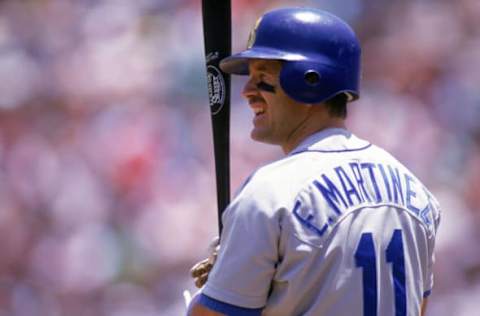
Edgar Martinez – 21.2 fWAR
I don’t know what to do about Edgar Martinez here. I think fans have either forgotten, or just plain don’t know, that Edgar played third base for quite a while, and he was actually pretty decent at it. Take a look at how Fangraphs and Baseball-Reference treated him. On Fangraphs, he had a -2, -1.9, 4.3, 14.0, 7.1, -8.3, -4.5, 5.1 on DEF from 1987-94. To compare, he was a 2.1 dWAR on BR. So he was actually adding value during the time that he was playing in the field.
Now, let’s look at how many games he actually played during that time. Out of a possible 612 games, he played 531 of them at third base, or 86.8%. So yes, for the first eight seasons of Edgar’s career, he was legitimately a third baseman. This brings up a couple of questions for my all-time lists. Should we split Edgar up, and put some of him at DH and some at 3B? Should I just leave him at DH since most think of him, rightfully so, as the greatest DH of all time?
Imagine doing this for Albert Pujols. He was an outfielder and a third baseman for his first three seasons (21.1 fWAR). What about Gary Carter, A-Rod, Jason Giambi, or Craig Biggio, amongst others? Shoot, you could make the argument that Randy Johnson is the Mariners greatest reliever ever since he did it (it would be an awful argument, but he did pitch in relief for a while).
I think I’m just going to acknowledge it this way. Edgar was incredible, we all know that. He moved to DH and inserted himself firmly as one of the most feared hitters in baseball. Maybe he would’ve been able to continue to do so at third. Maybe not. He did manage 21.2 fWAR while at third, including three straight seasons from 1990-92 of 5.5 fWAR or better, and every indication is he would’ve passed the eventual number one on the list.
I’m going to leave him out as a “special entrant”, as we all think of him as a DH. Edgar is the greatest player to ever play third for the Mariners, but he isn’t their greatest third baseman, and I think that is an important distinction to make. Let’s move on to the guys that we think of as third baseman, and see who made the top 5.
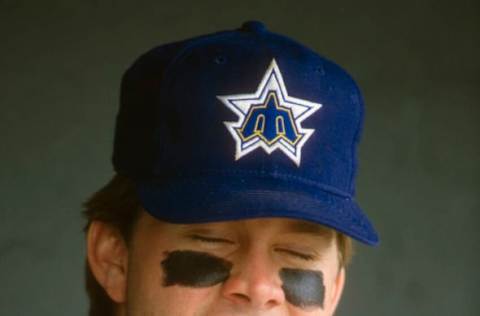
Mariners #5 Third Baseman: Jim Presley – 4.8 fWAR
Presley took over third for the Mariners back in 84, and at first, it looked like he was going to be another one and done at the position. He hit .227/.247/.402 with a 72 WRC+ in 70 games. Since he was only 22, the team decided to give him the job in 85 to see how he would do. It ended up being the right choice.
He would turn in the best season of his career, hitting .275/.324/.484 with a 114 WRC+, blasting 28 home runs, and accumulating a 2.9 fWAR. All six of those numbers would end up being career highs, as would his 7.0% walk rate and 16.0% K rate. With an ISO of .209 and a solid BABIP of .286, it seemed like the Mariners had a young stud on their hands. If he could do that at 23, imagine what he could do as he got more comfortable.
He stepped back a tiny bit in 86, striking out a lot more (26.1%), but was still a 2.1 fWAR. He scored a career-high 83 runs and drove in 107 RBI, also a career-best. 87 was another small step back. However, the power was still there with 24 homers, and he had a 1.8 fWAR.
If you’ve been doing the math so far, you know what’s coming. Presley would put up two consecutive subpar seasons of -0.8 and -0.5 fWAR, and then would be done in Seattle at the age of 27. He’s head to Atlanta for a year, and then the Padres, and by 1992 he was out of baseball. That three-year stretch was pretty good for the youngster though and gets him into the top five for Mariners third baseman all-time.
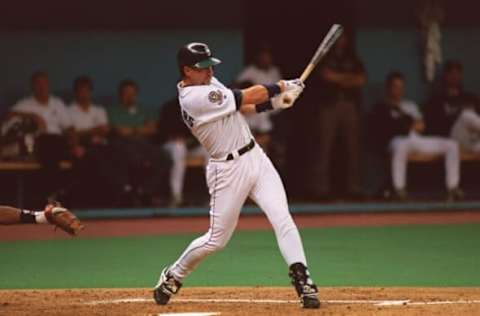
Mariners #4 Third Baseman: Mike Blowers – 6.2 fWAR
I loved watching Mike Blowers when I was a kid. All his best seasons happened as a member of the Mariners, and it’s kind of nice to sit back and be happy that it wasn’t the other way around. Blowers was a local guy, growing up in Washington, playing college ball in Washington, and it was nice to see him succeed at the major league level with the Mariners.
He came over from the Yankees in 1992 and kept his role as a bench/limited-time guy. That changed in 93 when Blowers would appear in 127 games (he had played 107 total the previous four years), and it would easily be the best season of his career. He hit .280/.357/.475, with a 122 wRC+, and found some power with 15 home runs. It was also his best defensive season and got him a 3.0 fWAR on the year.
94 was the strike, so he didn’t play as much. He still hit well though, even if the defense was never the same for him. He picked it back up in 95, hitting .257/.335/.474, blasting a career-high 23 home runs and setting career highs in runs and RBI as well with 59 and 96, respectively.
Blowers would leave to the Dodgers for the 96 season, and then come back to the Mariners and sport a 112 WRC+ in limited time in 1997. He left again in 98 but would come back in 99 to finish up his career with the M’s. He earned the majority of his WAR in 93-95, amassing 5.6 of his 6.2 total with the Mariners. Funny enough, his career total was 4.5, so he was a -1.7 outside of Seattle.
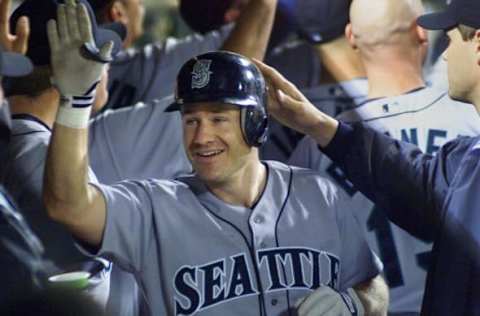
Mariners #3 Third Baseman: David Bell – 5.6 fWAR
Don’t get once in a generation confused with multi-generational. David Bell was the grandson of Gus Bell and son of Buddy Bell, making him the third generation Bell to play in the majors. He is just one of five families to accomplish the fact, and it was always something that would get brought up during his playing career.
Bell came to the Mariners at the deadline in 1998, being acquired from Cleveland for Joey Cora. Just 25, he would rake during that last month of the season, hitting .325. It’s a big part of the reason that I’m actually putting him ahead of Blowers.
He stuck around for four seasons and was a solid player the entire time. I sort of wish that he could’ve stuck around longer, but the Mariners sent him to the Giants after the 2001 season.
His best season with the Mariners was his last one, during that 2001 season. He would hit .260/.303/.415, with a WRC+ of just 90, but a low K rate of 11.6%. It wasn’t his offense that made him good though, it was his defense. He played the entire year at third, appearing in 134 games there. He dominated in TZ (total zone in runs above average) was +19. For reference, anything above 15 is considered Gold Glove Caliber.
That season was good enough for a 3.2 fWAR, the second-best mark he would put up in his entire career. The Mariners likely could’ve kept him around for a few more years instead of Jeff Cirillo, but the team wasn’t known for making the best moves back then.
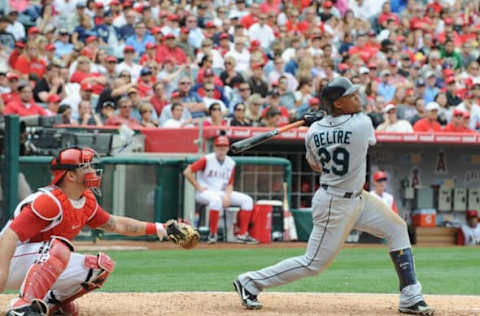
Mariners #2 Third Baseman: Adrian Beltre – 16.0 fWAR
In a way, I struggled with this. What it comes down to is sort of a common theme that will show up throughout this. The greatest Mariners player at a position is different than the Greatest player to play a position while on the Mariners. If you want to try and argue that Kyle Seager’s career is better than Adrian Beltre’s, then you are a moron. It’s that simple. Beltre is one of the greatest third basemen OF ALL TIME.
It’s too bad things didn’t work out better in Seattle. Seeing him dominating within the division was tough, especially since he did it for so long. If he could’ve stuck around, we wouldn’t have had Seager, but we would have had a HOFer on our hands. Mariners fans got upset when we suggested the team should take Seager’s number out of circulation. Beltre would’ve gone into Cooperstown.
It’s why we are only looking at Beltre’s time while he was on the Mariners. Beltre was actually below a 100 WRC+ when you combine everything together in his time in Seattle. The defense was on point though (other than 2007) and he ended up with a 19.0 fWAR in large part to the GG-worthy defense.
Other than his final season (WRC+ of 80) Beltre was actually pretty solid for the Mariners. He hit home runs, providing a decent middle-of-the-order bat while he was here. If he would’ve carried over the insane success he had in his final year as a Dodger or hit as he did in Boston or Texas, you could make the argument for putting him at the top of the list.
To me, he sticks at number 2, by himself. He’s well clear of third and well short of first. Beltre was a joy while he was here… just don’t touch his head.
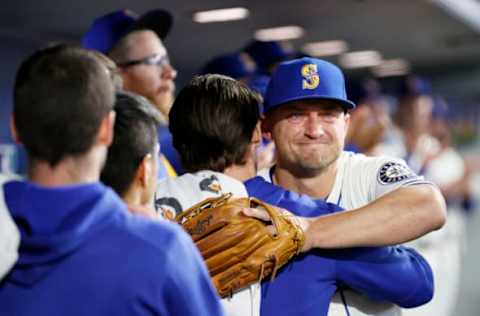
Mariners #1 Third Baseman: Kyle Seager – 34.8 fWAR
Was there really any question about this one? Well, okay, maybe there was. If you thought that I was going to put Beltre here because he clearly had the better career. Or Edgar, because, you know… it’s Edgar. In reality, it’s Kyle Seager who dons the cap as the greatest third baseman in the history of the Mariners.
It’s odd because Seager just retired and he debuted the same year as Mike Trout, who it seems like is smack in the middle of his career. We did get a great decade from Seager though. Clutch hits, great defense, home runs, and a fight against the shift during the second half of his career.
According to Fangraphs, Seager had just three negative marks in his career, excluding his rookie season. He put up a negative offensive number in 2018 and 2021, and a negative defensive number in 2020. He never had a negative fWAR season though, and his two worst seasons were a 1.5 in both 2020 and 2018.
Throw 2020 out, since it should actually be a 4.1 when you add the short-season multiplier to it. Seager never had a monster year either, with his max fWAR coming in both 2014 and 2016, when he had a 5.2. It was nice to have though. You were always gonna get just below all-star results from Seager. He might fall a bit short, and he might push for the All-Star game.
He retired with a total of 34.8 fWAR, good for 7th All-Time on the Mariners. We were lucky to have Seager, and he is well-deserving of the title of best third baseman to ever play the hot corner for the Seattle Mariners.
Ranking the Best Second Baseman in Mariners Team History. dark. Next
Stay tuned for the rest of the positional rankings throughout the history of the Mariners, and make sure to take some time to go back and read the ones that were already done. Go Mariners!